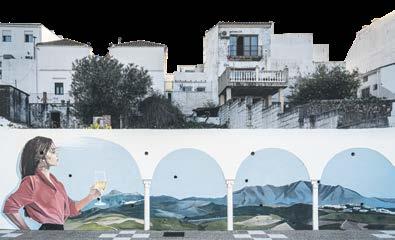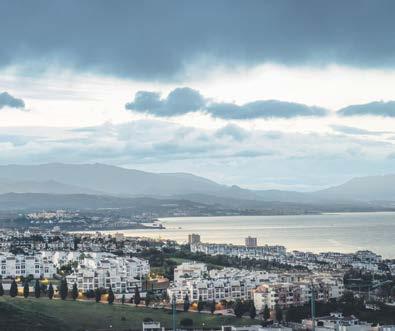
5 minute read
BRINGING STABILITY TO MANILVA
IT is the first time in Manilva’s recent history that a mayor’s tenure has not come to a premature end.
And Mario Jimenez’s six-and-a-half years in charge is all the more impressive, given the recent turmoil of Brexit, two years of Covid and the complicated Ukraine crisis. With nine mayors in just over 20 years it is fair to say, continuity has been in short supply.
“What I have brought is stability and seeing projects that often get cancelled through to the end,” he explains.
“I have worked hard to forge a good working relationship with the Junta and Malaga Diputacion and I understand the needs of the large expat population,” he adds. With a new cycle lane and footpath currently being installed between Manilva and Sabinillas and the promenade on its final leg, he has certainly got something to be proud of.
“Yes, the paseo maritimo took a bit longer than planned but it makes the area so much better for locals and particularly tourists,” he insists.
He is also excited about building a new theatre next to the town’s Institute, installing a new swimming pool in Manilva and clearing up the area around the ancient Castillo. The father-of-two is also adamant that he does not want any more development along the town’s eight kilometres of coastline.
“I’m a big fan of green spaces and the fantastic expanse of coastline we have. We are working really hard not to over-develop the coast and have actually dropped density levels since I came to power.”
A former plumber, he went into politics two decades ago as a councillor of sport, youth and infrastructure and knows his town like the back of his hand.
Initially from the IU (United Left) party, he is particularly proud of Manilva’s history.
“The Romans had a key base in Manilva and they made a lot of their celebrated fish paste Garum here, which was exported back to Rome.
“I am also fascinated by the Fortress of Los Castillejos de Alcorrín, an eighth century castle - and much older settlement - which was only discovered in 1989.” And a message to the huge number of foreigners who live here: “We are very proud that so many foreign residents have chosen Manilva as their home, in particular the British, who number nearly 4,000 on our official census.
“We hope to encourage more.” network of tracks is visible in between, inviting you out to hike, cycle or horse-ride.
Almost all of the locals that the Olive Press spoke to could remember back to those days. Most of them had been living in Manilva village all their lives, they all knew each other, and they had done so since childhood.
“This place is one big family,” lifelong resident Eligio told us.
Eligio, who’s sun-beaten blue eyes twinkled as he regaled us with tales of Manilva over two cañitas that he generously bought for us, said he spent most of his free time in the village church.
Nearby, a sign displayed the village motto: Very noble, very loyal.
Then another man who had been listening in walked over to our table, put his hands on Eligio’s shoulders, and told us with all sincerity that our new friend embodied this motto. It turned out that they had known each other since they were kneehigh, and Eligio had even worked for the man’s father.
Another short walk and a hop and you are down in San Luis de Sabinillas, or just ‘Sabby’ as it is affectionately known to the expats. Like everywhere else on the coast, it too has flourished under tourism in the last decade.
But there remains a tangible working atmosphere (it still has a small fishing fleet) and this is still a town where Spanish people enjoy their Spanish lives.
The blue flag beach stretches from Rio Manilva to Duquesa
Further along, and buried in Manilva’s historical heart a short walk from the centre, is St Anne’s church and adjoining cemetery, where Eligio liked to spend his time.
Who he was remembering he did not tell us. Turn a corner and there the 250-year-old church is; striking yet simplistic, bold yet unassuming.
Sauntering through the maze of white houses with their terracotta roofs, every ‘Hola’ from passers-by strengthens the feeling that Manilva is very much Spanish still.
Up on the mountain it is removed from the wave of tourism lapping at the coast. And then there are the postcard views from every direction, white houses spill down into vast vineyards with mountains out behind and the Costa del Sol to the front.


The Pedreta viewpoint delivers a view stretching from the white cluster that is the mountain-clinging Casares village to the coastal hubs of Estepona and Marbella below. A rich
A coastal stroll from Puerto Duquesa, Sabinillas has also become a popular destination for expats.
It is certainly a distinct community with a healthy mix of Spanish, expat English, German, as well as Moroccans and South Americans. It is also a veritable hive of commerce. While it wins no beauty awards, there is a great range of supermarkets and shops in Sabinillas.
‘Wall Street’ is where traditionally all the banks and insurance companies centred and down on the beach there is a great range of bars and restaurants which stretch into the distance on either side.

Back on the blue flag beach, that stretches all the way from Rio Manilva to Puerto Duquesa, fishermen still launch their boats and are often met by waiting restaurateurs upon their return, eagerly awaiting the days catch.
Sabinillas effectively bridges the gap between the multi-cultural, tourism-driven hub of Puerto Duquesa and the withdrawn, tranquil, traditional village of Manilva.
With the right blend of coastal expansion and Spanish tradition, it is easy to see why Manilva is making a name for more than just its wine.
Vetted And Approved
The importance of improved regulation in
Spanish real estate market
BRIAN Berney from C2C Properties is passionate about regulation in the real estate industry and concerned that the vast majority of real estate agents on the Costa del Sol are not members of any professional bodies or affiliated with the Official College of Real Estate Agents. He explains: “Not all agents are registered, as it is not required by law, but we’d highly recommend that buyers take care and make sure they are rep resented by a licenced agent. The Official College of Real Estate Agents protects buyers, as it ensures the agent has civil liability insurance, carries out continuous training and is subject to their Code of Ethics.
Before selecting an agent ask them which associations they are part of, and ask for their membership number to ensure that they are regulated and you are protected.
C2C Properties are regulated by Royal decree 1294/2007 and are members of the API and AIPP. This means that our team are qualified real estate professionals registered with and recognised by the Consejo General de los Colegios Oficiales de Agentes de la Propiedad Inmobiliaria de Españathe body which regulates the real estate market in Spain (membership number 29096122107C).
We’re also members of the Association of International Property Professionals (AIPP). As members of the AIPP, we have been vetted and approved, and we have voluntarily committed ourselves to industry regulation. We’re here to help buyers and sellers in Manilva, Sabinillas, Casares and Duquesa with their property journey.”






